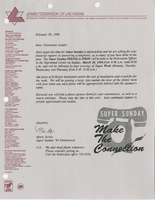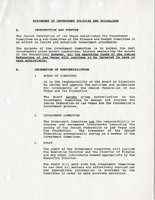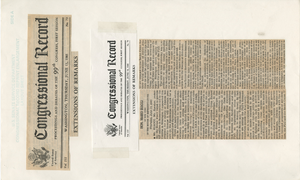Search the Special Collections and Archives Portal
Search Results

Transcript of interview with Gertrude Rudiak by Claytee White, January 11, 2007
Date
Archival Collection
Description
Gertrude (n?e Rightman) Rudiak was born in 1915 in North Dakota to Russian immigrants. She grew up in Wisconsin until 1924. That was the year the family drove to California via the Yellowstone Trail, a dusty, undeveloped road marked by yellow stones. In Los Angeles, her father practiced chiropractic, a holistic approach to well-being for which there was little knowledge at the time. Gertrude earned her music degree at University of California at Berkeley; a decision that did not lead to a career. She then attended a business college and got a job as a social worker in Northern California. In 1941, she met and soon married George Rudiak. It was the advent of World War II. George enlisted in the service and was assigned to Las Vegas Gunnery School (Nellis Air Force Base.) Since he had a law degree from University of California at Berkeley and passed the Nevada Bar exam, he found supplemental employment with local attorneys. Las Vegas became the Rudiaks? permanent home where they raised their five children. In this interview Gertrude recalls the stories of coming to live in Las Vegas of the 1940?s: their phone number was 1-2-3; the neighborhood they lived in longest being Scotch 80s and being part of the secular and Jewish communities.
Text
Dr. Ed Goldman oral history interview
Identifier
Abstract
Oral history interview with Dr. Edward Goldman conducted by Barbara Tabach on March 22, 2016 and April 04, 2016 for the Southern Nevada Jewish Heritage Project. Goldman discusses his career as a Clark County School District teacher, negotiator, and regional superintendent over the span of thirty years. He also talks about his activity in the Las Vegas, Nevada Jewish community at Temple Beth Sholom and being a founding member of Midbar Kodesh Temple.
Archival Collection
Michael Cherry oral history interview
Identifier
Abstract
Oral history interview with Michael A. Cherry conducted by Barbara Tabach on September 19, 2014 for the Southern Nevada Jewish Heritage Project. In this interview, Justice Michael Cherry talks about how he came to Las Vegas, Nevada and his work as a public defender and as a lawyer in private practice. He also discusses his involvement with Jewish organizations in various capacities, and his involvement with high-profile cases such as the MGM Grand and Las Vegas Hilton fires, earning him the nickname "master of disaster."
Archival Collection
Minutes from Temple Beth Sholom Board of Directors meetings, January 1957 - April 1963
Date
Archival Collection
Description
The meeting minutes of the board of directors of Temple Beth Sholom, then known as the Jewish Community Center of Las Vegas, Inc., include the proceedings of meetings held from 1957 to 1963.
Text
Jacob Paz oral history interview
Identifier
Abstract
Oral history interview with Dr. Jacob Paz conducted by Claytee D. White on September 15, 2014 for the Southern Nevada Jewish Heritage Project. Paz discusses growing up in Israel and obtaining a green card to attend New York University in 1974. He then talks about his sense of community within the Jewish part of Las Vegas, Nevada and his affirmations on the Holocaust.
Archival Collection
Henry Kronberg oral history interview
Identifier
Abstract
Oral history interview with Henry Kronberg conducted by Barbara Tabach on February 26, 2015 for the Southern Nevada Jewish Heritage Project. In this interview Kronberg talks about his childhood in Germany and Poland, his experience being imprisoned by the Gestapo, and being transported to a concentration camp. He talks about surviving the Holocaust and meeting his wife. He discusses being reunited with his sister in Las Vegas, Nevada after decades of searching. Kronberg discusses purchasing Stoney's, a loan and pawn shop, anti-Semitism, and water resources in Southern Nevada.
Archival Collection
Gertrude Rudiak oral history interview
Identifier
Abstract
Oral history interview with Gertrude Rudiak conducted by Claytee D. White on January 11, 2007 for the Boyer Early Las Vegas Oral History Project. In this interview, Rudiak discusses her personal history and being a member of the Jewish community of Las Vegas, Nevada. She describes her husband being stationed in Las Vegas while serving in the United States military, their move to Las Vegas in the 1940s, and his law career after military service. Rudiak discusses race relations in Las Vegas during that time and her husband's efforts to pass a law to end segregation in Nevada as a state assemblyman. Rudiak's son, Richard Rudiak, also speaks, and talks about political history in Nevada during the late 20th century. They conclude by discussing the opening of a Jewish school in Las Vegas, the history of Jewish people in the city, and how Las Vegas and its casinos have changed.
Archival Collection



